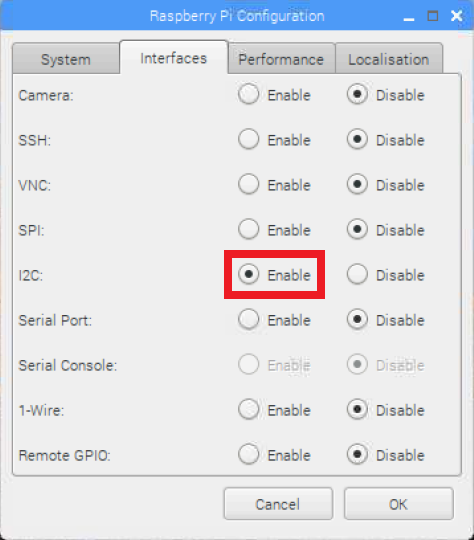SparkFun Auto pHAT Hookup Guide
Software Configuration
Enable the I2C Bus
Configuring an OS for the Auto pHAT is relatively simple; the I2C interface will need to be enabled.
Nvidia Jetson
The I2C bus on the Nvidia Jetson is enabled by default; no configuration is necessary.
Raspberry Pi
On the Raspberry Pi, this is easily accomplished within the Raspberry Pi PIXEL desktop. Using the graphical Raspberry Pi Configuration application from the Preferences menu will be the most user friendly option. Users can also make changes through the console based raspi-config application.
Once done, click the OK button. Reboot the Raspberry Pi when prompted.
Install the Python Packages
Note: This tutorial assumes you are using the latest version of Python 3. If this is your first time using Python or I2C hardware on a Raspberry Pi, please checkout our tutorial on Python Programming with the Raspberry Pi and the Raspberry Pi SPI and I2C Tutorial.
We've written a Python packages to easily get setup and utilize the Auto pHAT. There are two methods for installing the Python packages:
- Install the all inclusive SparkFun Qwiic Python package.
- Independently install the various Python packages:
pi-servo-hatsparkfun-qwiic-pca9685
sparkfun-qwiic-scmdsparkfun-qwiic-dual-encoder-readersparkfun-qwiic-icm20948
The all inclusive SparkFun Qwiic Python package, is recommended as is also installs the required I2C driver as well.
Note: Don't forget to double check that the hardware I2C connection is enabled on your Raspberry Pi or other single board computer.
SparkFun Qwiic Package
This repository is hosted on PyPi as the sparkfun-qwiic package. On systems that support PyPi installation via pip3 (use pip for Python 2) is simple, using the following commands:
For all users (note: the user must have sudo privileges):
language:bash
sudo pip3 install sparkfun-qwiic
For the current user:
language:bash
pip3 install sparkfun-qwiic
Upgrading the Python Package
In the future, changes to the Python package might be made. Updating the installed packages has to be done individually for each package (i.e. sub-modules and dependencies won't update automatically and must be updated manually). For example, with the sparkfun-qwiic-scmd Python package use the following command (use pip for Python 2):
For all users (note: the user must have sudo privileges):
language:bash
sudo pip3 install --upgrade sparkfun-qwiic-scmd
For the current user:
language:bash
pip3 install --upgrade sparkfun-qwiic-scmd

